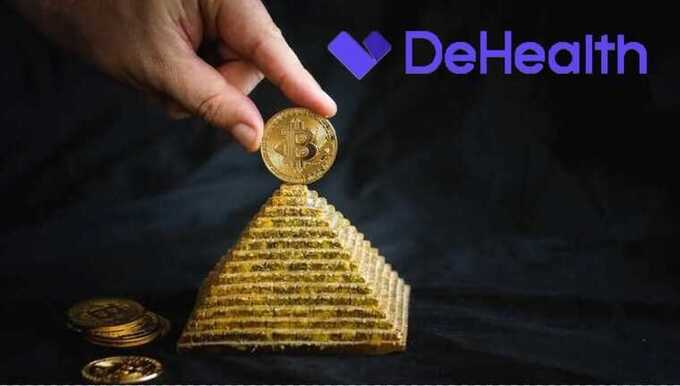Crypto pyramid “DeHealth”: a criminal scam empire for pumping money out of gullible citizens
It seems that financial pyramids have been around since at least two people were born. Every year the volume of criminal schemes not only grows, but also constantly improves. Since the beginning of global digitalization, pyramid schemes have gone online en masse. Concepts such as “scam” (theft of financial data online), “infogypsy” (imposition of trainings, seminars, goods at exorbitant prices) and others have appeared.
The DeHealth startup combines several types of modern schemes. At the same time, as our correspondents were able to establish, there is a long criminal trail behind people associated with the company. Judging by excerpts from criminal proceedings, there is nothing new there. All the same old crimes: tax evasion, money laundering, official forgery and others.
How the DeHealth scheme works and which of the main players in the pyramid are under the watchful eye of the investigation.
Medical data in cryptocurrency
What is DeHealth? – this question will probably be the first to arise among our readers. Officially, the company is a unique startup focused on collecting patient health data to further improve disease detection and treatment. At first glance, everything looks very innovative and useful, but is it all so?
The official DeHealth website is only available in English, and this despite the fact that the organization was founded by Ukrainians who position themselves as patriots of their state. The DeHealth website makes it clear that you can share your medical data with the service on an anonymous basis. All medical confidentiality is encrypted by artificial intelligence and cannot be accessed by unauthorized persons. The most interesting thing is that users who agree to provide their medicinal data are also promised payment in the form of the service’s cryptocurrency.

Screenshot of DeHealth website
So far everything looks more than interesting. The company noted not only international organizations as its partners, but also the Ministry of Health of Ukraine.
We decided to check whether the Ukrainian government agency actually signed agreements with the cryptocurrency service.
There is no confirmation of the platform’s work with the Ministry of Health. On the Ministry’s website there is news about the signing of a memorandum of cooperation with the IHealth information system, not DeHealth.
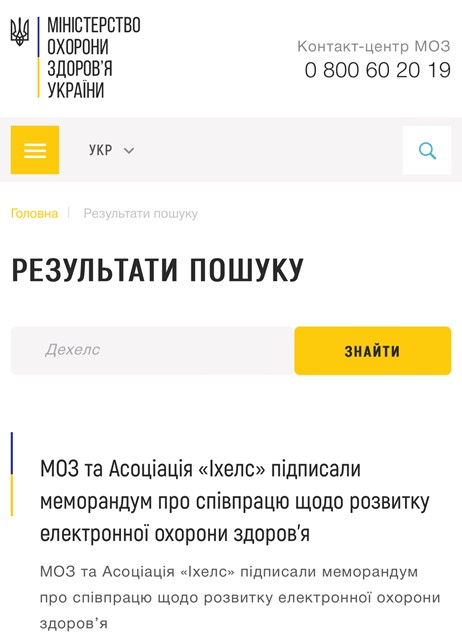
Screenshot of the Ministry of Health website
Therefore, we are inclined to believe that on the company’s website the mention of government bodies exists only to increase the weight of the platform.
Also, as follows from registry of medical institutions connected to the central database system of the electronic health system, Dehels is not involved in this project. All this indicates that the company has only a virtual relationship with the Ukrainian healthcare system.
Let’s return to the most interesting thing – money. According to Dehels developers, for registering and transferring their personal data, users can receive the DHLT cryptocurrency. We did not find this currency on the exchanges, and this signals that it is completely unknown to the world of digital assets.

Information about the DHLT cryptocurrency on the Kuna exchange
We still managed to find the Dehels coin on the specialized Coinmarket service. It costs as much as 0.00055 US dollars (about 2 kopecks). At its best (at the time of its creation), DHLT was worth 3 cents, but over the past year the cryptocurrency has been steadily falling in price. We reached out to digital asset experts who clearly assured us that this is the typical path of unknown coins in the crypto market – the most likely thing to happen next is a crash.
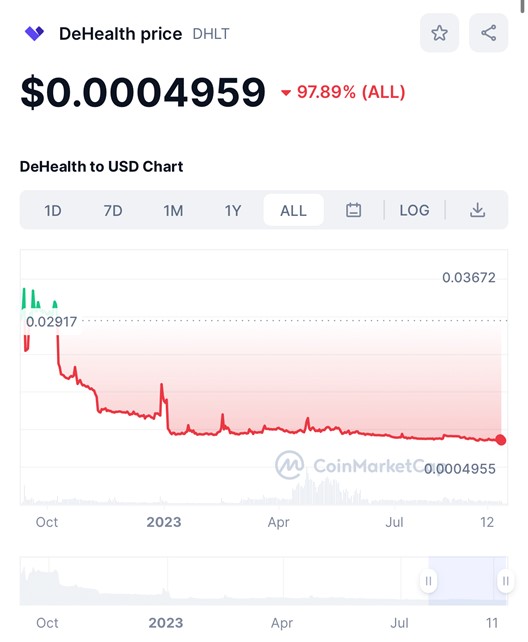
DHLT coin price (Coinmarket service information)
According to data from the profile service, a billion of these coins have been created in total. Their total cost is 495 thousand US dollars. At the same time, the company did not guarantee its asset with its own funds, therefore, not a single person who has cryptocurrency, in the event of a total fall, will receive anything. 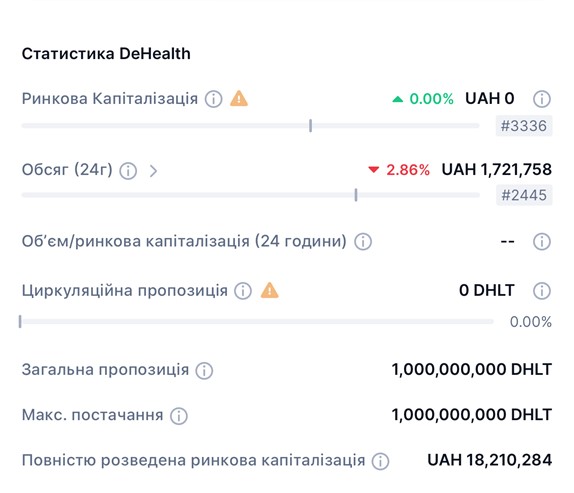
Information about the capitalization of the DHLT coin
That is, the service promises users who risk sharing their personal data under conditions of anonymity a worthless digital asset.
The criminal trail of the organizers
The main active persons in Dehels are Anna Bondarenko and Denis Tsvaig (former surname – Tsvaigov). Although according to official data, since 2021 Tsvaigov (Zweig) has no connection with the company, back in April of this year he was positioned as CEO (general director of an enterprise).

Anna Bondarenko with Denis Tsvaigov
According to the register of legal entities, DeHealth’s main activities are medical institutions and medical practice. Although if you look at the information on the website, the company acts as a database and financial company. There is an obvious violation, since a digital asset is also a kind of financial activity, but for some reason they decided not to declare it. As the OpenDataBot service notes, Dehels’ VAT payer’s certificate has been revoked, and the company itself is registered at the place of mass registration.
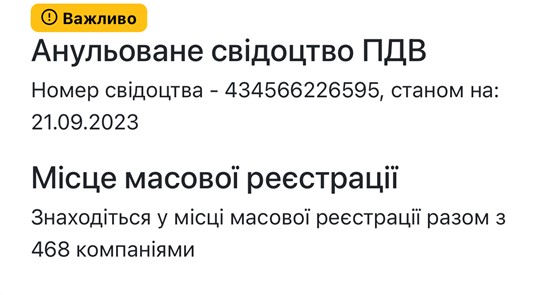
This suggests that the “successful healthcare startup” is not that successful. Anna Bondarenko herself, who claims to be a crypto investor, has not always been an expert in the field of modern assets.
While Bondarenko worked as a sole proprietor, she provided beauty salon services, sold food products, tobacco products and clothing. Currently, her textile retail business continues to operate; all other sole proprietorships have been liquidated.
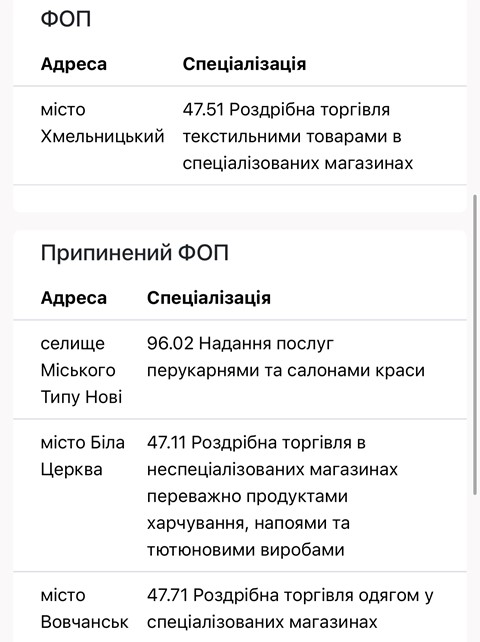
Also, Bondarenko, together with her husband, is the founder of PALSON KIFOT LLC. The authorized capital of the enterprise is 100 UAH, and, judging by the financial data, it does not operate. “PALSON KIFOT” is a clothing brand registered under Bondarenko. The last mention of it in public sources dates back to 2018, when the latest publications were published on the company’s Instagram.

Screenshot of Instagram “PALSON KIFOT”
Another legal entity that Bondarenko owns is the charitable organization Dehels. It is also difficult to say anything about the activities of the fund, because it did not submit financial statements, it does not have social networks or a website.
However, after checking the information about the officials of the charitable organization DeHealth Foundation, we found one very interesting information. Dmitry Alperin Alperin was elected as the head of the legal entity in February 2023. Alperin is a serious businessman, judging by the companies registered to him. He is the owner of 4 businesses. In the best of times, the companies’ assets reached a billion hryvnia, but since 2020, Alperin’s most successful company, Il-Sole, began the bankruptcy process. This happened against the background of the commencement of criminal proceedings, which are still under investigation by the Office of the Prosecutor General of Ukraine.
Il-Sole and a number of other companies, the founder of which was Dmitry Alperin, were suspected of a whole bunch of criminal activities, including tax evasion, official forgery, bribery, terrorist financing, money laundering, etc. Based on these facts, criminal proceedings were initiated and entered into the ERDR under No. 22020000000000032 dated 02.26.2020 on grounds of criminal offenses under Part 2 of Art. 364, part 2 art. 364, part 3 art. 258-5, part 2 art. 364, part 3 art. 212, part 3 art. 209, part 2 art. 361, part 2 art. 205-1, part 2 art. 362 of the Criminal Code of Ukraine. As the investigation established, a group of people, by prior conspiracy, with the aim of evading taxes and legalizing income, created huge conversion centers thanks to dozens of fictitious companies. These companies registered people in difficult financial situations who were found via the Internet.
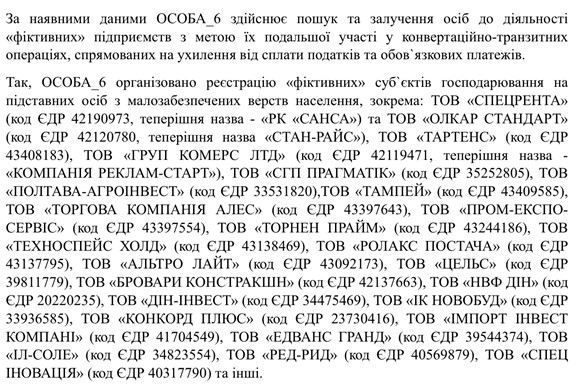
Extract from criminal proceedings No. 22020000000000032
In September 2021, an amazing thing happened – a serious proceeding, in which dozens of criminals could have been arrested and hundreds of millions of hryvnia returned to the state, suddenly fell silent. Despite the fact that a procedural decision was not made (i.e. the proceedings were not closed), all investigative actions were terminated. Why? – the question is rhetorical.
Realizing that, on the one hand, responsibility can be avoided, but on the other, it is no longer possible to continue the scheme, the companies involved in illegal actions began to go bankrupt. As a result, the schemers made money twice: first from criminal manipulations, and then from withdrawing funds from bankrupt enterprises.
A similar situation occurred with the financial company Avisto, the founder of which was another company, Allasio LLC, the ultimate beneficiary of which was Alperin. “Avisto” was involved in criminal proceedings for tax evasion on an especially large scale, entered into the ERDR under No. 32021111000000004 on grounds of offenses, the punishment for which is provided for in Part 3 of Art. 212 of the Criminal Code of Ukraine. In this case, tax officials established what can already be called classic for Alperin’s business – it is possible to evade taxes by falsifying documents and using fictitious persons. As was confirmed in court, the administration of the tax activities of FC Avisto was carried out by the Bankruptcy Laboratory company, which probably helped other enterprises submit fictitious reports to the tax authorities.

Extract from criminal proceedings No. 32021111000000004
Oddly enough, this criminal proceeding was buried in the second half of 2021.
Despite the fact that Alperin’s companies were worth about $40 million at their best, no information could be found about the multimillionaire entrepreneur. He may be the latest figurehead in the Dehels story.
Business at your own risk
What do we have as a result? DeHealth invites people to sell their data for a digital asset – a cryptocurrency that is worthless and is unlikely to ever become more valuable. For this, users are promised complete confidentiality of medical information. But can a company that does not officially have the right to operate in the financial market promise people the secrecy of information about their health? Hardly.
In general, all this looks like a simple scam: people are promised money for information, but in fact the clients receive ordinary “candy wrappers.” How Dehels then manages confidential data is an open question. It is possible that user bases are then resold for further use in secret.
Moreover, officials of the Dehels Foundation have significant experience in crime. Therefore, it is possible that this whole relationship is not accidental.

